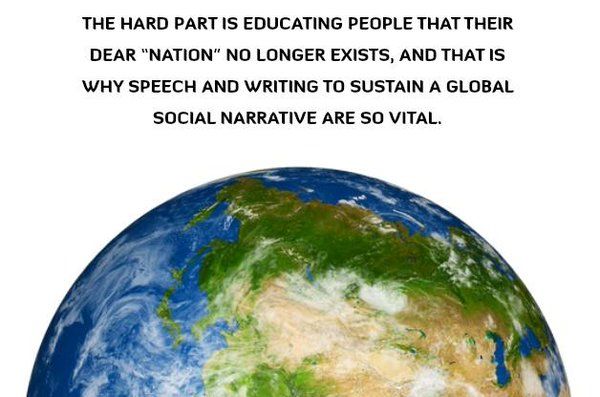FUTURISM UPDATE (November 11, 2014)
TECHCRUNCH: Microsoft CEO Satya Nadella details his views on what Google and Apple do best http://tcrn.ch/1ypN0D4
REUTERS: Iranian-built copy of U.S. drone takes first flight http://lnkd.in/ddzJxZs
REUTERS: U.S. Postal Service data breach may compromise staff, customer details http://lnkd.in/dZcfTtf
GARTNER: Gartner Identifies the Top 10 Strategic Technology Trends for 2015 http://lnkd.in/ds775sy
THE ECONOMIST: Google announces its own delivery drones project http://lnkd.in/dYZvgmp
THE ECONOMIST: Bioprinting: Building living tissue with a 3D printer is becoming a new business, but making whole organs for transplant remains elusive http://lnkd.in/dqs5auN
THE ECONOMIST: 3D printing software. Something out of nothing http://lnkd.in/dJTzBtH
NEW YORK TIMES: Dinner Is Printed. THE hype over 3-D printing intensifies by the day. Will it save the world? Will it bring on the apocalypse, with millions manufacturing their own AK-47s? http://lnkd.in/dJDkKsy
FORBES: 3D Printers Will Soon Change The World, If It’s Not Strangled In A Lawyered Up World http://lnkd.in/dvX4t82
NEW YORK TIMES: Drones Outpacing Rules as Popularity Soars in New York http://lnkd.in/dtwTd_V
REUTERS: Stratasys sees robust 3D-printing market as HP reveals plans http://lnkd.in/dDMrtXz
REUTERS: Google tests airborne drones to deliver goods http://lnkd.in/dUjbYMn
WALL STREET JOURNAL: How 3-D Printing Will Change Our Lives http://lnkd.in/d7W-RJf
WALL STREET JOURNAL: FAA Clears Six Film Companies to Use Drones http://lnkd.in/d-YinFT
WALL STREET JOURNAL: Deutsche Post DHL to Deliver Medicine via Drone http://lnkd.in/dwfEJAy
WALL STREET JOURNAL: FAA Gives Approval to BP to Use Commercial Drones http://lnkd.in/dhvCSPn
WALL STREET JOURNAL: It’s Time to Take Artificial Intelligence Seriously http://lnkd.in/d4zDn5p
WALL STREET JOURNAL: Zuckerberg, Musk Invest in Artificial-Intelligence Company http://lnkd.in/dMWyvhY
NEW YORK TIMES: Artificial Intelligence as a Threat http://lnkd.in/dfCRiPN
REUTERS: ABB invests in U.S. artificial intelligence company http://lnkd.in/d55PRMW
THE ECONOMIST: Clever cogs. The potential impacts of intelligent machines on human life http://lnkd.in/dTu-Zvm
THE ECONOMIST: The language of the internet of things. More and more devices are becoming connected, but will they speak the same language? http://lnkd.in/dMDQGqB
REUTERS: Don’t fear the Internet of things http://lnkd.in/dABmEja
NEW YORK TIMES: With $30 Million More in Hand, IFTTT Looks to the Internet of Things http://lnkd.in/d-Qg4pk
THE ECONOMIST: The dodgiest duo in the suspect six. As emerging economies hit hard times, Brazil and Russia look particularly weak http://lnkd.in/dy8dvbd
FOREIGN AFFAIRS: Who Is at Fault in Ukraine? Foreign Affairs’ Brain Trust Weighs In http://lnkd.in/dM8riM9
FINANCIAL TIMES: Google moves into Nasa’s territory http://on.ft.com/1yrP7WZ
DER SPIEGEL: Mr. Europe? The Ghosts of Jean-Claude Juncker’s Past Come Back to Haunt Him http://lnkd.in/dnWZFmT
DER SPIEGEL: Iranian Nuclear Negotiator: ‘We Can’t Just Turn Back the Clock’ http://lnkd.in/dSQJcSX
FORBES: Toyota’s next Camry will also be made of aluminum: http://onforb.es/1EvrbWS
CIO: Home Depot Says 53 Million Email Addresses Compromised During Breach http://lnkd.in/dshY3if
BY MR. ANDRES AGOSTINI
White Swan Book Author (Source of this Article)
http://www.LINKEDIN.com/in/andresagostini
http://www.AMAZON.com/author/agostini
http://www.appearoo.com/aagostini
http://connect.FORWARDMETRICS.com/profile/1649/Andres-Agostini.html
@AndresAgostini
@ThisSuccess




